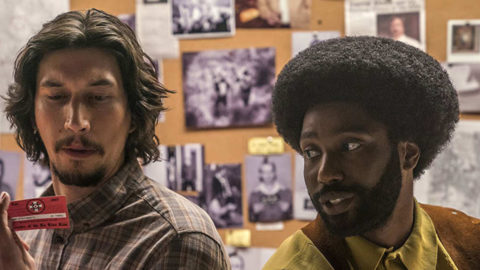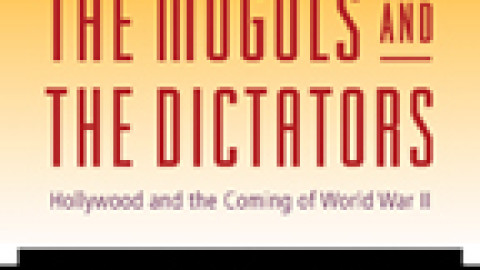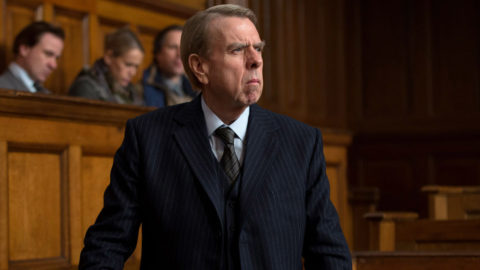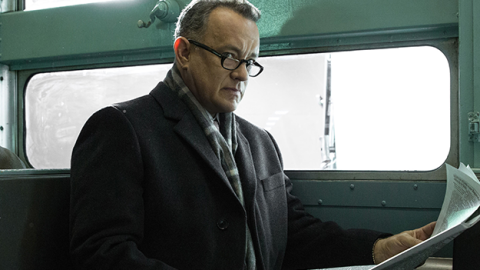Deep Focus: Operation Finale
The timing couldn’t be better for a youthful fan favorite like Oscar Isaac—Resistance fighter Poe Dameron in the current Star Wars trilogy—to play Israeli agent Peter Z. Malkin, who captured Adolph Eichmann, the SS organizer of the “Final Solution to the Jewish Question.” After all, 22 percent of American millennials say they haven’t heard of the Holocaust or can’t be certain they have, according to a study by the Conference on Jewish Material Claims Against Germany. Malkin actually grabbed Eichmann by the throat during the kidnapping and persuaded him to sign a statement that he was willing to stand trial in Israel and answer charges of war crimes, genocide, and crimes against humanity. (Malkin called his 1990 memoir, written with Harry Stein, Eichmann in My Hands.)
Operation Finale bears the same name as the mission of Mossad and Shin Bet agents who, in 1960, ambushed Eichmann (played here by Ben Kingsley) in a Buenos Aires suburb and wrested him away from fascist Argentines and émigrés, including his rabidly anti-Semitic son Klaus (Joe Alwyn). The movie attempts to recapture the historical moment when Third Reich atrocities started to fade from public consciousness for multiple reasons: the escalating Cold War and its rehabilitation of Nazi scientists, Israel’s need to firm up and defend its fledgling state, German leaders’ resistance to looking back, concentration-camp survivors’ reluctance to relive past horrors, and their children’s determination to obliterate the “Jewish victim” stereotype. As the movie asserts, Eichmann’s capture and trial were significant not just for bringing the Holocaust’s architect to justice, but also for enabling survivors to face him and bear witness on behalf of those who died—two-thirds of European Jewry. The Israeli attorney general, Gideon Hausner (Allan Corduner), said in his opening statement, “With me are six million accusers.” Newspaper readers, radio listeners, and TV watchers across the globe heard this outcry.
The film’s director, Chris Weitz (A Better Life, About a Boy), and its screenwriter, Matthew Orton, gamble that zeroing on Malkin’s personal and professional conflicts will make the story more accessible to audiences who regard the postwar years as prehistoric. It doesn’t pay off. The potentially rich narrative combines action and espionage, political expose, memory play, psychological combat, and a snatch of courtroom drama. The film fictionalizes setups and collapses factual details while trying to make Eichmann’s extraction play out with conventional suspense; it ends up a poor cousin to Argo. The flimsiest contrivance is the creation of a composite female squad member Dr. Hanna Elian (Melanie Laurent), who is also supposed to be Malkin’s ex-lover. (The real doctor was Yonah Elian.) Still, it mostly parallels the historical record. What’s missing is some essential glue to hold the pieces together—whether a sustained rush of energy or inspiration or some dazzling exposition and analysis.
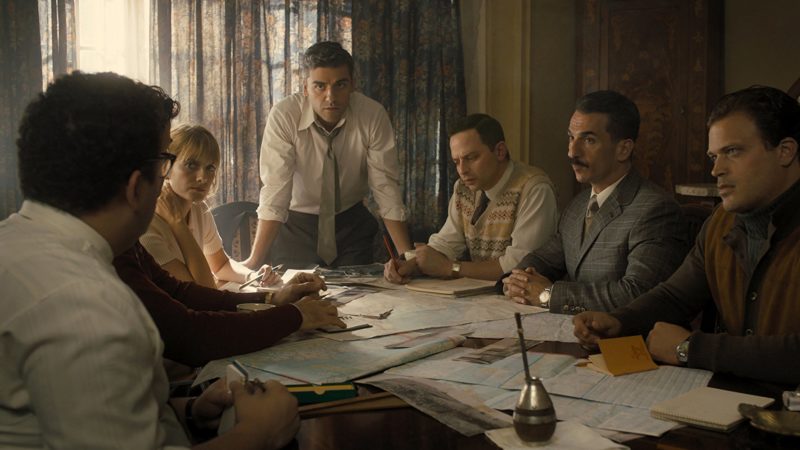
The movie begins in 1954 with a grave vignette. Disguised as a British officer, Malkin and his fellow operatives pay a Yuletide visit to the Austrian chalet of a man they think is Eichmann. The target hides two books with swastika bindings as Malkin comes to the door. The other agents drag the husband and father out of the house before Malkin discovers they’ve got the wrong Nazi. A child watches from a second-story window.
The filmmakers aim to contrast this botched assignment with Operation Finale’s rigorous design to bring Eichmann to Israel alive. Their juxtaposition of callous agents and a happy family gathered round the Tannenbaum alienates us before the movie proper starts. Are we in for another muddled sermon about “the cycle of violence,” a la Munich? No: this film means to be tough-minded, not suicidal. Nonetheless, it’s a jarring introduction.
The subject matter calls for the special skill of a Costa-Gavras—the ability to marshal vast amounts of information for maximum dramatic potency. In terrific films like Z, The Confession, State of Siege, and Music Box, he triggers mass catharsis by uncovering political conspiracy and/or historical denial. The best parts of Operation Finale are brisk and revelatory in the Costa-Gavras manner. They depict Argentinian fascism circa 1959 via the mini-romance between fetching teen brunette Sylvia Hermann (Haley Lu Richardson) and cute blond guy Klaus Eichmann (Alwyn). Sylvia’s blind lawyer father Lothar (Peter Strauss) has never told her that he’s a half-Jewish Dachau survivor until he realizes that Klaus Eichmann’s uncle, “Ricardo Klement,” could really be the young man’s father, Adolph Eichmann. When Klaus escorts Sylvia to a gala for Catholic and right-wing elites that escalates into a neo-Nazi rally, she walks out—and her dad Lothar reaches out to a Nazi-hunting German prosecutor who convinces Israeli authorities to launch their own investigation. Sylvia then pretends she wants to patch things up with Klaus, so Israeli agents can drive her to his house and snap hidden-camera pictures of Adolph. In these swift, lucid vignettes, the filmmakers pull off the Costa-Gavras trick of using real-life melodrama to compose a teeming political canvas. They vividly illustrate Sylvia’s courage when it came to confirming Eichmann’s identity, and in so doing convey the confusion, cunning, and anti-Semitism that made Argentina a haven for runaway Nazis. (In the great “meta” movie stroke that begins the sequence, Sylvia locks eyes with Klaus in a movie theater, where he and two Aryan buddies react loutishly to the racial tragedy of Douglas Sirk’s Imitation of Life. Director Weitz’s mother, Susan Kohner, plays the black girl passing for white in Sirk’s film.)
When Operation Finale abruptly swings into play, the filmmakers strive mightily to make Isaac’s Malkin the red-hot center of the action, though he actually works under Shin Bet chief Rafi Eitan (Nick Kroll) and Mossad chief Isser Harel (Lior Raz). The script doesn’t give Isaac the underpinnings for a great performance, but he generally brings off Malkin’s transformation from breezy, patriotic adventurer to moral avenger. (His most moving acting comes in the heartbreaking coda.) He and Kroll develop a comic give-and-take that feels organic, and Isaac’s unpredictable instincts and charm contrast strikingly with the focused strength of Raz, who is best known as the star and co-creator of Israel’s Netflix hit Fauda.
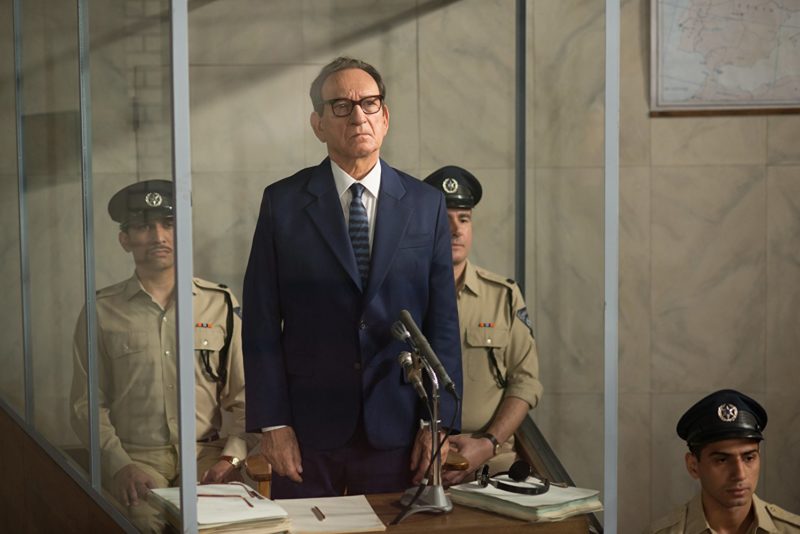
Unfortunately, whenever Malkin alone takes the spotlight, the filmmakers adopt a self-conscious, impressionistic style of storytelling that leaves us in limbo. They want his recurring visions of Nazis threatening and murdering his sister Fruma (Rita Pauls) to suggest him coming to terms with the Shoah and reckoning with his personal hatred for Eichmann. But images of Fruma and her three children are edited clumsily into the narrative, obscuring the action instead of deepening it. The introduction of Malkin’s expressionistic painting of a blue forest where he thinks his sister met her death comes to us—well, out of the blue. In real life he was a gifted artist, but the movie fails to demonstrate how his talent figures into his personality or work. And I suppose we’re meant to think that he gains clues about Eichmann’s inner workings by molding a bust of his head.
Isaac does generate some potent friction with Michael Aronov as the meticulous interrogator Zvi Aharoni. According to Neal Bascomb’s book Hunting Eichmann, the attorney general (then Haim Cohen) had advised Aharoni “that it would be better if Eichmann came willingly to Israel and wanted, if possible, a signed statement to that effect.” With predictable melodramatic heightening, the movie says that El Al Israel Airlines refused to fly Eichmann to Israel without that declaration. The action hinges on Malkin challenging Aharoni’s by-the-book methods for gaining Eichmann’s signature. Malkin believes that Eichmann wants the world—and his sons—to hear his case that he was merely in charge of paperwork and behaved like any disciplined soldier defending his fatherland and following orders. So Malkin uses Eichmann’s egotistical pride as a family man and concerned parent to craft a strategy that could break through his refusal to cooperate.
Terrible makeup threatens to sabotage Kingsley’s brilliantly self-aware performance. The actor is 20 years older than Eichmann was in 1960; adjusting his face for the age gap meets with disastrous results. But with each creak and gasp, every wheedling request and disingenuous proclamation, Kingsley creates a character so manipulative that we almost accept he can persuade Malkin of his humanity—and so anti-Semitic and spiteful that he can pierce that illusion with unspeakable sadism.
Hannah Arendt’s Eichmann-inspired concept—“the banality of evil”—has hovered over all subsequent interpretations of this bureaucratic killer. Saul Bellow, for one, agreed that Hitler turned his desire for “Jews to be destroyed” into “a wish [that] was tantamount to an order.” He derided, though, “people easily satisfied with formulas” for reducing “the demonic genius of this political achievement” to “‘the banality of evil.’”
Thirty-five years ago, the publishers of Eichmann Interrogated, which contained selected transcripts of his pretrial interrogation, rightly asked whether it would “reinforce Arendt’s perception of Eichmann as quintessentially ‘normal.’ Or is it possible that she and others were misled by a charade he had carefully rehearsed?”
Kingsley takes the latter view and stands Arendt’s formulation on its head. He transcends the film’s disappointments and flaws and indelibly portrays “the evil of banality.”
Michael Sragow is a contributing editor to Film Comment and writes its Deep Focus column. He is a member of the National Society of Film Critics and the Los Angeles Film Critics Association, and a contributor to the Criterion Collection.



